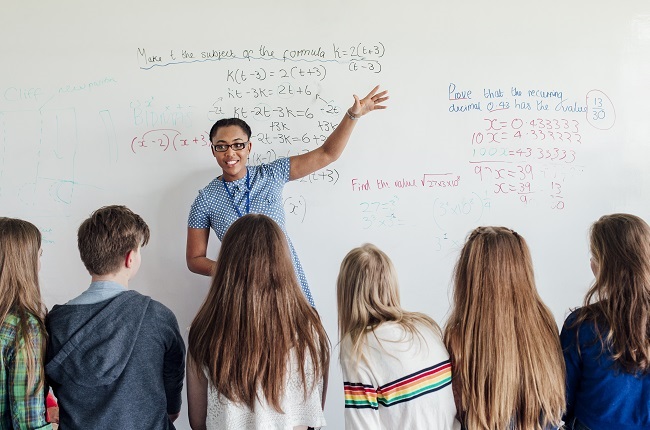
Recent research has it that these subjects pose significant problems for second-language learners of English, writes University of the Free State research fellow Arlys van Wyk.
Many pupils struggle to pass mathematics at school level, while others struggle to pass the required chartered accountancy exams. Are these assessments too difficult or, is there an underlying challenge that is being overlooked?
Accountancy, like mathematics, depends mainly on numbers and calculations with little emphasis on language - or not? Recent research has it that these subjects pose significant problems for the second-language learner of English.
Those students, who are studying in a language that is not their mother tongue, need much language support as they battle the new academic language and general, academic language acquisition, simultaneously.
Both these subjects require students to master specialised technical vocabulary, as well as general academic vocabulary that covers the conceptualisation of these fields. While it takes only two years to acquire proficiency in a spoken language, it takes five to six years to acquire proficiency in academic language.
ALSO READ | OPINION | Calvin Matlou and Siseko Maposa: Bold steps needed to transform SA's education sector
This second type of proficiency can be acquired only in the learning situation, such as at school or at a tertiary institution. Being fluent in spoken English does not mean fluency in academic English. The requirements are fundamentally different.
Proficiency in English academic language requires the learner to understand and be able to write and read in increasingly difficult academic language. Students need a sight vocabulary of at least 40 000 words to really be successful at university. A student should understand 95% of the words in a textbook or academic article to be able to interpret the content meaningfully.
Reading and writing must be taught systematically as discipline-based subjects for several years before academic language proficiency is achieved. Conversational language, on the other hand, is acquired quite rapidly and the vocabulary needed is less demanding. One can rely on the additional support of facial expression, gestures and eye movement for meaning-making.
Second-language students can succeed, but need support
Students coming from a schooling background where they have not received systematic teaching in the kind of language skills needed for learning, are at a disadvantage which is likely to overwhelm them throughout their academic lives.
Children learn best in their mother tongue, but can learn in a second language if the support and accommodations are made to facilitate language acquisition. This requires that teachers possess the expertise needed to provide this support needed for this challenging situation.
Specialised expertise is needed to support learners studying in a second language. For English, one of the qualifications that equip educators in this field is known as Teaching English to Speakers of Other Languages (TESOL).
Teachers trained in this field have the expertise to make the accommodations required in the classroom to assist learners to attain the academic language skills needed for success.
Thus, learners grow in conceptual knowledge in their subject areas as well as in their ability to apply the language skills needed to learn to classify, analyse, compare, identify cause and effect, and be able to interpret increasingly complex texts and also, write incrementally more difficult essays.
For many, this is difficult. Consequently, many students become progressively so desperate as they struggle to access university content that they resort to plagiarism and copying as a means of survival.
Mathematics does not involve long written passages as it uses various modes of communication such as graphs, charts, table symbols and teacher-talk to support meaning-making. However, these short passages contain vital information needed to complete a problem effectively.
Learners need to gain the required vocabulary and learn to understand the structure of a mathematics text. They must acquire the specialised language needed to describe concepts, such as isosceles, hypotenuse and decimal and have a good knowledge of technical terms such as base, place, power and co-ordinate. These technical terms are used outside the field of mathematics but have special significance when used in the maths classroom.
Secondary meaning of words
Second-language speakers often have knowledge of the primary meanings of words, but not the secondary meanings especially those that pertain to mathematics. Many of these words are derived from Latin and Greek and need to be clearly explained to learners. The second-language learner needs systematic step-by-step structure (scaffolding) in the classroom for mathematics literacy engagement to take place meaningfully.
Teachers involved in the teaching of maths and later, accounting, to multilingual learners need to scaffold the content of every lesson. To do this step-by-step modelling of procedures needs to be made explicit.
In the primary grades, teaching aids, such as building blocks or beads are used to demonstrate the procedures in a concrete way. In higher grades, calculators and computers or rulers can be used to enable learners to experience the results of a calculation for themselves. Learners acquire concepts much more effectively by, for example, physically acting out commands that demonstrate a principle.
It is important that learners gain the concept that is being taught, but sadly, often teacher-talk alone does not achieve conceptual learning. Once the learners understand the concept, they will be more likely to grasp the words used to talk about it. This type of modelling should continue, at least, up to the first-year level at tertiary institutions. Assumptions cannot be made about students' conceptual knowledge.
Language and subject matter should be taught concurrently
Based on recent research, an important way of extending learners' academic, subject language is to raise their awareness of word families and word structure. For example, what is the root of a word such as, decimal or that the Latin root for subtract is traho which means pull or take away? This could be followed by students recognising that words like tractor and traction come from the same root. So, the language of mathematics grows, and an understanding of the language structure is fostered.
Thus, the language of mathematics and other subjects, such as, accounting are taught cumulatively, and students acquire an understanding of the way academic English functions while growing their conceptual knowledge and learning the technical terms vital to comprehension of the subject.
Learners who are systematically exposed to this kind of language support for five to six years are more ready to face the challenge of writing academic assessments in their second language.
- Arlys van Wyk has a 23-year history in the field of English academic literacy. She is an adjunct professor at the University of the Free State where she headed up a unit for English language development.
To receive Opinions Weekly, sign up for the newsletter here. Now available to all News24 readers.
*Want to respond to the columnist? Send your letter or article to opinions@news24.com with your name, profile picture, contact details and location. We encourage a diversity of voices and views in our readers' submissions and reserve the right not to publish any and all submissions received.
Disclaimer: News24 encourages freedom of speech and the expression of diverse views. The views of columnists published on News24 are therefore their own and do not necessarily represent the views of News24.




 Publications
Publications
 Partners
Partners























